Related Research Articles

Abraham Stoker was an Irish author who is celebrated for his 1897 Gothic horror novel Dracula. During his lifetime, he was better known as the personal assistant of actor Sir Henry Irving and business manager of the Lyceum Theatre, which Irving owned. In his early years, Stoker worked as a theatre critic for an Irish newspaper, and wrote stories as well as commentaries. He also enjoyed travelling, particularly to Cruden Bay where he set two of his novels. During another visit to the English coastal town of Whitby, Stoker drew inspiration for writing Dracula. He died on 20 April 1912 due to locomotor ataxia and was cremated in north London. Since his death, his magnum opus Dracula has become one of the most well-known works in English literature, and the novel has been adapted for numerous films, short stories, and plays.
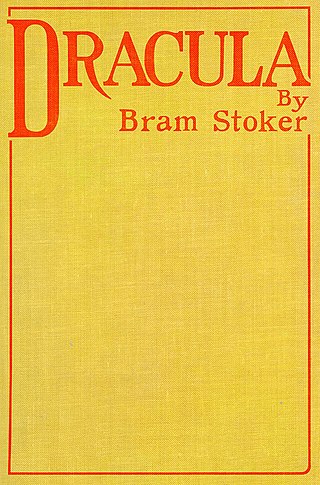
Dracula is a novel by Bram Stoker, published in 1897. An epistolary novel, the narrative is related through letters, diary entries, and newspaper articles. It has no single protagonist, but opens with solicitor Jonathan Harker taking a business trip to stay at the castle of a Transylvanian nobleman, Count Dracula. Harker escapes the castle after discovering that Dracula is a vampire, and the Count moves to England and plagues the seaside town of Whitby. A small group, led by Abraham Van Helsing, hunt Dracula and, in the end, kill him.
The Scholomance was a fabled school of black magic in Romania, especially in the region of Transylvania. It was run by the Devil, according to folkloric accounts. The school enrolled about ten students to become the Solomonari. Courses taught included the speech of animals and magic spells. One of the graduates was chosen by the Devil to be the Weathermaker and tasked with riding a dragon to control the weather.

Vampire films have been a staple in world cinema since the era of silent films, so much so that the depiction of vampires in popular culture is strongly based upon their depiction in films throughout the years. The most popular cinematic adaptation of vampire fiction has been from Bram Stoker's 1897 novel Dracula, with over 170 versions to date. Running a distant second are adaptations of the 1872 novel Carmilla by Sheridan Le Fanu. By 2005, the Dracula character had been the subject of more films than any other fictional character except Sherlock Holmes.

Jonathan Harker is a fictional character and one of the main protagonists of Bram Stoker's 1897 Gothic horror novel Dracula. His journey to Transylvania and encounter with the vampire Count Dracula and his Brides at Castle Dracula constitutes the dramatic opening scenes in the novel and most of the film adaptations. Stoker appropriated the surname from his friend Joseph Cunningham Harker (1855–1920), a set designer at the Lyceum Theatre and father of actor William Gordon Harker (1885–1967) as well as great-grandfather of actress Polly Adams, whose actress-daughters Susannah Harker and Caroline Harker adopted the Harker surname for their stage names.
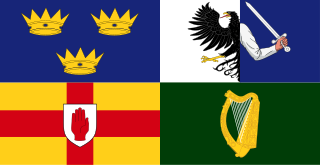
Abhartach, also Avartagh, is an early Irish legend, which was first collected in Patrick Weston Joyce's The Origin and History of Irish Names of Places (1870). Abhartach should not be confused with the similarly named Abartach, a figure associated with Fionn mac Cumhaill.
The Dracula Society is a London-based literature and travel group with an interest in supernatural and macabre works of fiction, as exemplified by Bram Stoker's Dracula.
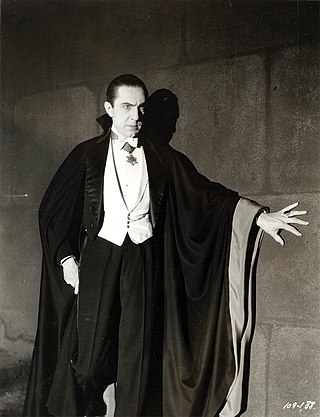
Count Dracula is the title character of Bram Stoker's 1897 gothic horror novel Dracula. He is considered to be both the prototypical and the archetypal vampire in subsequent works of fiction. Aspects of the character are believed by some to have been inspired by the 15th-century Wallachian Prince Vlad the Impaler, who was also known as Dracula, and by Sir Henry Irving, an actor for whom Stoker was a personal assistant.

Dracula, also known as Bram Stoker's Dracula and Dan Curtis' Dracula, is a 1974 British made-for-television gothic horror film and adaptation of Bram Stoker's 1897 novel Dracula. It was written by Richard Matheson and directed by Dark Shadows creator Dan Curtis, with Jack Palance in the title role. It was the second collaboration for Curtis and Palance after the 1968 TV film The Strange Case of Dr. Jekyll and Mr. Hyde.
The character of Count Dracula from the 1897 novel Dracula by Bram Stoker, has remained popular over the years, and many forms of media have adopted the character in various forms. In their book Dracula in Visual Media, authors John Edgar Browning and Caroline Joan S. Picart declared that no other horror character or vampire has been emulated more times than Count Dracula. Most variations of Dracula across film, comics, television, documentaries predominantly explore Dracula as he was portrayed in film with only a few more closely adapting Stoker's original narrative. These including borrowing the look of Count Dracula in both the Universal's series of Dracula and Hammer's series of Dracula, including include the characters clothing, mannerisms, physical features hair style and his motivations such as wanting to be a nearby home away from Europe.

Dracula's Guest is a short story by Bram Stoker, first published in the short story collection Dracula's Guest and Other Weird Stories (1914). It is believed to be the first chapter for Stoker's 1897 novel Dracula, but was deleted prior to publication as the original publishers felt it was superfluous to the story.
Leslie S. Klinger is an American attorney and writer. He is a noted literary editor and annotator of classic genre fiction, including the Sherlock Holmes stories and the novels Dracula, Frankenstein, and Strange Case of Dr. Jekyll and Mr. Hyde as well as Neil Gaiman's The Sandman comics, Alan Moore's and Dave Gibbons's graphic novel Watchmen, the stories of H.P. Lovecraft, and Neil Gaiman's American Gods.
Elizabeth Russell Miller was a Professor Emerita at Memorial University of Newfoundland. She resided in Toronto. In her early academic career, she focused on Newfoundland literature, primarily the life and work of her father, well-known Newfoundland author and humorist Ted Russell. Since 1990, her major field of research has been Bram Stoker's novel Dracula, its author, sources and influence. She has published several books on the subject, including Reflections on Dracula, Dracula: Sense & Nonsense, a volume on Dracula for the Dictionary of Literary Biography and, most recently, Bram Stoker's Notes for Dracula: A Facsimile Edition with Robert Eighteen-Bisang. She founded the Dracula Research Centre and was the founding editor of the Journal of Dracula Studies now at Kutztown University of Pennsylvania.

Castle Dracula is the fictitious Transylvanian residence of Count Dracula, the vampire antagonist in Bram Stoker's 1897 horror novel Dracula.The first few scenes and last few such as where he dies also take place here.
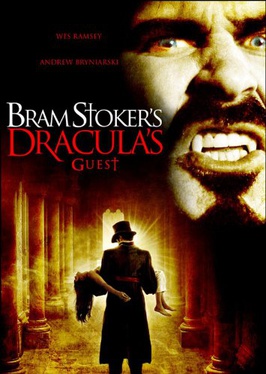
Bram Stoker's Dracula's Guest is a 2008 film that was written and directed by Michael Feifer. It was released direct to video in August 2008 and is loosely based on Bram Stoker's short story "Dracula's Guest".
John Edgar Browning is an American author, editor, and scholar known for his nonfiction works about the horror genre and vampires in film, literature, and culture. Previously a Visiting Lecturer at the Georgia Institute of Technology, he is now a professor of liberal arts at the Savannah College of Art and Design in Atlanta, Georgia.
The Lord Ruthven Award is an annual award presented by the Lord Ruthven Assembly, a group of academic scholars specialising in vampire literature and affiliated with the International Association for the Fantastic in the Arts (IAFA).
Bibliography of works on Dracula is a listing of non-fiction literary works about the book Dracula or derivative works about its titular vampire Count Dracula.
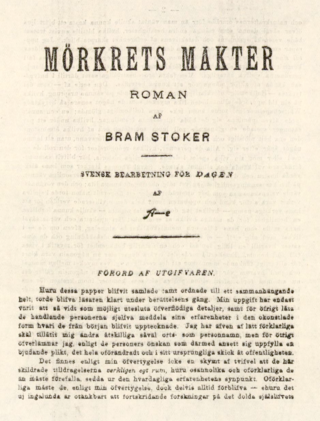
Powers of Darkness is an anonymous 1899 Swedish version of Bram Stoker’s 1897 novel Dracula, serialised in the newspaper Dagen and credited only to Bram Stoker and the still-unidentified "A—e."
References
- ↑ "Robert S. Eighteen-Bisang". Brantford Expositor. Retrieved 2 November 2020.
- ↑ Now, Surrey (31 Oct 2008). "Does this man think he's a vampire?". Canada. Archived from the original on 26 June 2014. Retrieved 2 May 2014.
- ↑ "Robert Eighteen-Bisang". Science Fiction Awards Database. Retrieved 3 May 2014.
- ↑ "Vampire Stories". Publishers Weekly. Retrieved 3 May 2014.
- 1 2 3 Zamprelli, Pascal (1 Dec 2008). "The Indie scene". Archived from the original on 4 May 2014. Retrieved 2 May 2014.
- ↑ "Vancouver Backgammon Club". Vancouver Backgammon Club. Retrieved 3 May 2014.
- ↑ "VINTAGE VAMPIRE STORIES Edited by HWA Member Robert Eighteen-Bisang". Dark Whispers. Retrieved 3 May 2014.
- ↑ "Vintage Vampire Stories". Abe Books. Retrieved 3 May 2014.
- ↑ Eighteen-Bisang, Robert. "Dracula, Jack the Ripper and A Thirst for Blood". Casebook. Retrieved 3 May 2014.
- ↑ Holte, Jim. "the Journal of the Fantastic in the Arts, vol 21".
{{cite web}}: Missing or empty|url=(help) - ↑ "An Unquenchable Thirst" . Retrieved 2 May 2014.
- ↑ "Transylvania". Transylvania Press. Retrieved 2 May 2014.
- ↑ Stoker, Bram (2008). Bram Stoker's Notes for Dracula: A Facsimile Edition. McFarland. ISBN 9780786477302.
- ↑ Doyle, Arthur Conan (2013). Vampire Stories. Skyhorse Publishing, Inc. ISBN 9781628731453.
- ↑ Dalby, Richard (2013). Vintage Vampire Stories. Skyhorse Publishing, Inc. ISBN 9781626368804.
- ↑ Best New Horror, Volume 6. Carroll & Graf. 1994. p. 17. ISBN 9780786702770.
- ↑ Miller, Elizabeth (2005). Bram Stoker's Dracula: a documentary volume. Thomson Gale. ISBN 9780787668419.
- ↑ Barsanti, Michael (2008). Bram Stoker's Notes for Dracula: An Annotated Transcription and Comprehensive Analysis. McFarland & Company. ISBN 978-0786434107.
- ↑ Picart, Caroline Joan (Kay) (2010). Dracula in Visual Media: Film, Television, Comic Book and Electronic Game Appearances, 1921-2010. McFarland. ISBN 9780786462018.
- ↑ Guiley, Rosemary (1994). The complete vampire companion . Macmillan. p. 198. ISBN 9780671850241.
- ↑ Stoker, Bram (2008). The New Annotated Dracula. W. W. Norton & Company. pp. xxiv, xlix, 7, 235. ISBN 9780393064506.